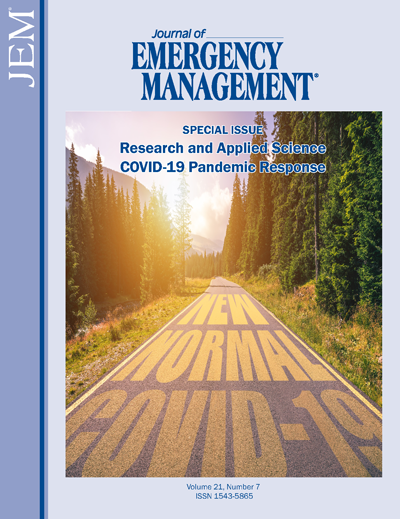COVID-19 self-medication treatment: Media’s adverse effect based on people’s level of education
DOI:
https://doi.org/10.5055/jem.0696Keywords:
self-medication, COVID-19 prevention, media adverse effect, WHO, healthcareAbstract
Objective: Self-medication has become a major concern among nonmedical professionals during the treatment of COVID-19. Such concerns have been attributed to the adverse effect of information shared via media outlets. Here, a survey was undertaken among nonhealthcare professionals to find out the adverse effect of media on self-medication for treating COVID-19.
Methods: A questionnaire-based survey was conducted electronically among nonmedical professionals (270 respondents). The questionnaire comprised three main components: demographic, education, and factor for self-medication. Statistical analysis of the data was made using analysis of variance to determine the degree of agreement between the response of participants with education below and above graduation.
Results and conclusion: Most of the respondents agreed that they get information about the COVID-19 medicines from different media. However, most of them do not visit the reliable source like World Health Organization (WHO) website to get information about COVID-19. The respondents were aware of the usage of medications such as Remdesvir, azithromycin, vitamins, herbal preparations, paracetamol, and cetirizine for COVID-19. The usage of herbal preparation may be due to their promotion in the media as over the counter drugs (OTC) products. It has been proposed to create more awareness and warning signs for the patients in and around pharmacy and hospital. Media campaign to create awareness for the prevention of COVID-19 spread should also be added with a caution line not to use any medication for treatment without prior consultation with physician. The matter of concern is that only a small fraction of the respondents follow WHO website to get information regarding COVID-19, which mandates to create awareness among the public regarding the role of WHO in healthcare. A significant agreement was noted between below graduates and post-graduates regarding questions such as visiting WHO website and the safety of taking medicine without consulting physician. Media is a contributing factor to self-medication, and measures of caution are highly imperative.
References
Alduraywish SA, Altamimi LA, Aldhuwayhi RA, et al.: Tharkar sources of health information and their impacts on medical knowledge perception among the Saudi Arabian population: Cross-sectional study. J Med Internet Res. 2020; 22(3): e14414. DOI: 10.2196/14414.
Available at https://www.chinatoday.com.cn/China_Focus/The_Daily_Mail_Pakistan/202010/t20201008_800222869.html. Accessed March 2021.
Available at https://www.nationalgeographic.com/science/article/as-coronavirus-surges-how-hospitals-are-treating-covid-disease. Accessed March 2021.
Tasnim S, Hossain MM, Mazumder H: Impact of rumors and misinformation on COVID-19 in social media. J Prev Med Public Health. 2020; 53(3): 171-174. DOI: 10.3961/jpmph.20.094.
Mallhi TH, Khan YH, Alotaibi NH, et al.: Drug repurposing for COVID-19: A potential threat of self-medication and controlling measures. Postgraduate Med J. 2020; 2020: 138447. DOI: 10.1136/postgradmedj-2020-138447.
Roman BR, Moscoso S, Chung SA, et al.: Treatment of COVID-19 in peru and bolivia, and self-medication risks. Revista Cubana de Farmacia. 2020; 53(2): 1-20.
Quispe-Canari JF, Fidel-Rosales E, Manrique D, et al.: Self-medication practices during the COVID-19 pandemic among the adult population in Peru: A cross-sectional survey. Saudi Pharmaceut J. 2021; 29(1): 1-11. DOI: 10.1016/j.jsps.2020.12.001.
World Health Organization: The Role of the Pharmacist in Self-Care and Self-Medication [Internet]. Geneva: World Health Organization, 1998. Available at http://apps.who.int/medicinedocs/pdf/whozip32e/whozip32e.pdf. Accessed March 2021.
Mohammad-Saleem TS, Lokanath N, Ramkanath S, et al.: Evaluation of self medication among professional students of Rjampet. Int J Res Pharmaceut Sci. 2012; 3(3): 1-5.
Marcelo BM: COVID-19 and the rush for self-medication and self-dosing with ivermectin: A word of caution. One Health. 2020; 10: 100148.
Afolabi AO: Factors influencing the pattern of self-medication in an adult Nigerian population. Ann Afr Med. 2008; 7(3): 120-127.
Mohammed NA, Karwan HS: Self-medication practice among patients attending a sample of primary health care centers in Erbil city. J Educ Practice. 2016; 7(24): 73-79.
Soroush A, Abdi A, Andayeshgar B, et al.: Exploring the perceived factors that affect self-medication among nursing students: A qualitative study. BMC Nurs. 2018; 17(1): 1-7.
Acharya AS, Prakash A, Saxena P, et al.: Sampling: Why and how of it. Indian J Med Special. 2013; 4(2): 330-333.
Panda DS, Gamal M, Zafar A, et al.: A study on the effectiveness of online teaching in pharmacy education from teacher and student perspectives during the COVID-19 pandemic. Pharm Educ. 2020: 20(2): 297-301.
Abdelhafiz AS, Mohammed Z, Ibrahim ME, et al.: Knowledge, perceptions, and attitude of Egyptians towards the novel coronavirus disease (COVID-19). J Community Health. 2020; 45(5): 881-890.
Alqahtani A, Aldahish A, Krishnaraju V, et al.: General public knowledge of coronavirus disease 2019 (COVID-19) at early stages of the pandemic: A random online survey in Saudi Arabia. Patient Prefer Adher. 2021; 15: 601-609.
Omar MRS, Rita B, Bijoylaxmi S, et al.: Assessing the perceptions and practice of self-medication among Bangladeshi undergraduate pharmacy students. Pharmacy. 2018; 6: 1-12.
Malik M, Tahir MJ, Jabbar R, et al.: Self-medication during COVID-19 pandemic: Challenges and opportunities. Drugs Ther Perspect. 2020; 36: 565-567. DOI: 10.1007/s40267-020-00785-z.
Peilin S: The treatment of COVID-19 with Chinese herbal medicine. J Chin Med. 2020; 123: 59-68.
Naves JOS, Castro LLC, Carvalho CMS, et al.: Automedicacao: Uma abordagem qualitativa de suas motivacoes. Ciênc Saúde Coletiva. 2010; 15: 1751-1762.
OTC Pharm: Available at http://www.indiaoppi.com/IndiaOTCpharmaProfile2011/. Accessed July 17, 2020.
Limaye D, Limaye V, Krause G, et al.: Systematic review of the literature to assess self-medication practices. Ann Med Health Sci Res. 2017; 7: 1-15.
Schweim H, Ullmann M: Media influence on risk competence in self-medication and self-treatment. Ger Med Sci. 2015; 13: 1-14.
Nasir M, Salauddin Chowdhury AS, Zahan T: Self-medication during COVID-19 outbreak: A cross sectional online survey in Dhaka city. Int J Basic Clin Pharmacol. 2020; 9(9): 1325-1330.
Downloads
Published
How to Cite
Issue
Section
License
Copyright 2007-2025, Weston Medical Publishing, LLC and Journal of Emergency Management. All Rights Reserved.
Leave Nobody Behind: Emergency Management in a More Inclusive Way is a trademark of Journal of Emergency Management






